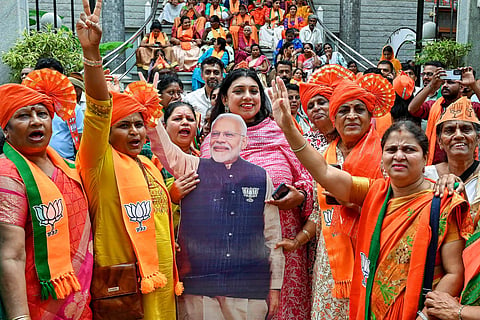

The more things change, the more they stay the same. The dictum may not be true for the larger national mandate, but the electoral landscape of the south indicates a sense of continuity amid the larger landscape of change.
Factor in the interplay of continuity and the change—compared to 2019, the vote share and seat tally of the BJP and the NDA, Congress and INDIA parties along with other regional parties changed at the state level.
In Tamil Nadu, where the BJP decided to go without the AIADMK, it has failed to win even a single seat, but, at the same time, it secured about 11 percent votes on its own. The state gave an almost clean sweep to the DMK-and-Congress-led alliance. Similarly, in neighbouring Kerala, while the BJP won one Lok Sabha seat for the first time and partially increased its vote share from 13 percent in 2019 to around 17 percent in 2024, the overall mandate remains almost the same.
Karnataka is a mixed bag this time. In the backdrop of the whopping majority the Congress got in May 2023, its performance is below the expectation as it won nine out of the state’s 28 parliamentary seats. However, the party’s vote share increased by almost 14 percentage points. Therein, BJP contested three fewer seats this time but lost around 6 percent of the votes apart from losing eight seats.
Move slightly north to Telangana and Andhra Pradesh, and the picture shifts qualitatively for the BJP. In Telangana the saffron party doubled its seat tally, from four in 2019 to eight in 2024, while its vote share increased from 20 percent to 35 percent. The same was true for the Congress. The grand old party increased its seat tally from three to eight Lok Sabha seats and had a 10 percent rise in its vote share. The absolute loser there is the regional party Bharat Rashtra Samithi, which failed to win a single seat and lost around 25 percent of its votes.
If Telangana is about the electoral marginalisation of the regional party, the story in Andhra remains a saga of contestation between the two state parties, the YSR Congress and the Telugu Desam Party, where the two national parties, the BJP and the Congress, are marginal players.
The YSR Congress, which had won 22 seats out of Andhra Pradesh’s 25 seats in the 2019 Lok Sabha election, could win just four seats this time, while its vote share fell from around 50 percent to 40 percent—a massive fall. On the other hand, TDP’s hiatus from power ended after a decade as it secured a whopping majority in the state assembly election, besides catapulting NDA’s tally there to 21 seats.
Overall, while NDA’s tally in the southern states increased from 30 seats in 2019 to 41 seats in 2024, BJP’s overall tally remained the same at 29. Nevertheless, the fixity of the BJP’s seat tally has a subtext too. Now the BJP is a significant presence in all the southern states, rather than being a player just in Karnataka.
From the INDIA bloc’s point of view, the south has been a big gain. Their tally increased from 58 seats in 2019 to 74 in 2024; the Congress also increased its seat tally from 27 to 40.
While the southern states have their own specificities, the overall trend in the region ends up confirming the trends in other regions. If Telangana and Andhra emerged as swing states in favour of the BJP, Karnataka have a dent to the party vehicle, and Kerala and Tamil Nadu may now be seen as future catchment areas.
So the 2024 electoral verdict presents a broad shift in the political dynamics in the south. There are two visible trends. First, three states—Karnataka, Kerala and Telangana—are rewarding national parties at the cost of the regional ones. The sad state of the BRS and JD(S) are cases in point. This shift also indicates the integrative drive of the southern states, where they are letting go of the parties which once were the votaries of regional identities and interests. However, Andhra Pradesh and Tamil Nadu throw up a different picture in which the national parties have been either at the margin or play second fiddle to dominant regional parties. The alternating stint in power between the YSR Congress and the TDP is likely to stay in the near future in Andhra. The DMK remains a hegemon in Tamil Nadu while the AIADMK has shown it still has a formidable vote share. The failure of the BJP to wean away AIADMK votes maintains the regional-party-centric character of the state.
Further, the 2024 strategy for the BJP in Tamil Nadu, where the party decided to break its alliance with the AIADMK, was considered by many as a bold move signifying their intent to make the electoral battle an ideological one. By winning 11 percent of the votes, though the party may feel motivated for a future endeavour, the verdict makes things ambiguous for the party in the immediate run.
While the southern states have their individual specificities, the region is very much in sync with the cluttered template of other regions. Hence, the framing of Indian politics as a binary of north vs south paradigm may be more of a cliché than the ground reality.
(Views are personal)
(sajjanjnu@gmail.com)
Sajjan Kumar | Political analyst associated with PRACCIS, a Delhi-based research institution